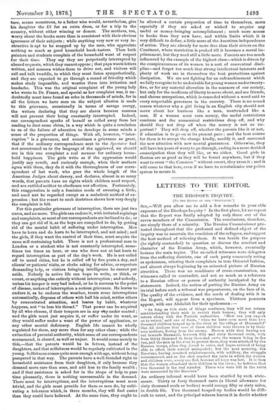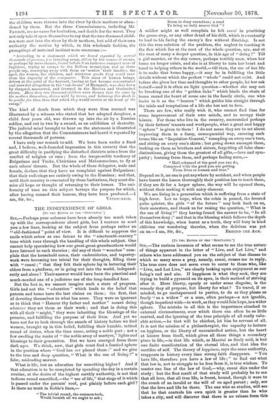LETTERS TO THE EDITOR.
THE RIIODOPE INQUIRY.
ITO THE EDITOR OF TDB " SPECTATOR.")
you allow me to add a few remarks to your able exposure of the Rhodope Inquiry ? In the first place, let me repeat that the Report was finally adopted by only three out of the
seven members of the Commission. The conclusions, therefore, are simply those of a minority. The Russian Commissioner pro- tested throughout that the professed and defined object of the inquiry was to ascertain the condition of the refugees, and suggest the best method of relieving them. It was beside the purpose (he rightly contended) to question or discuss the conduct and character of the Russian Army, which, however, eventually became the main topics. The so-called witnesses were delegates from the suffering districts, one of each party commonly acting as spokesman, uttering their complaints iu true Oriental fashion, and almost always beginning by an animated picture of Russian atrocities. There was no semblance of cross-examination, no witnesses called to contradict, and not so much as a reference to a Russian officer or person of authority inculpated by the statements. Indeed, the notion of putting the Russian Army on its trial before such a tribunal was preposterous, on the face of it. The quality of the evidence, and the mode of dealing with it in the Report, will appear from a specimen. Thirteen peasants appear, with one Abdallah for their spokesman :— ‘, As long as this state of things continues, they will not return notwithstanding their wish to revisit their homes ; they will only return along with the Turkish authorities. How can you expect us to return,' said one of them, when we have seen more than two thousand children heaped up in the river at the village of Hermann?' One Ali declares that some of those children were thrown in by their own mothers, fleeing from the enemy. 'Tessin adds that having set out towards Hermann, between fifty and sixty thousand souls, with from thirty thousand to forty thousand carts, the women being in the van, and the men in the rear, to protect them, they were attacked by the Russian troops, whom they Arced to retire, and hopes revived of being able to effect their retreat unimpeded ; but the next morning, the Russians, having received reinforcements, with artillery, the struggle recommenced, and as the shot reached the carts in which the women and children wore, every one fled, because all hope was lost. It is then that the women abandoned their children in the river; he believes that two thousand is the real number. Those who wore loft in the carte were massacred by the Russians."
An ordinary tribunal would have been startled by such state- ments. Thirty or forty thousand carts (a liberal allowance for sixty thousand souls or bodies) would occupy fifty or sixty miles, in double file. Two thousand heaped-up bodies would be diffi- cult to count, and the principal witness leaves it in doubt whether the children were thrown into the river by their mothers or aban- doned by them. But the three Commissioners, including Mr. Fawcett, see no cause for hesitation, and decide for the worst. They not only take it upon themselves to say that the two thousand child- ren were cast into the river by their mothers, but add of their own authority the motive by which, in this wholesale fashion, the promptings of maternal instinct were overcome :-
"According to a statement which we heard repeated by several thousands of persons, the invading army, either by the course of events, or perhaps by mere chance, found before it an immense compact mass of fugitives, trying to escape to the Balkan mountains, and as these people say, conveying away with them on arabas ' their familic., the aged, the women, the children, and whatever goods they could save from the rapacity of the conqueror. This mass of human beings, driven at the point of the bayonet, having at last become concentrated and crowded altogether in the ' cul-de-sac' of Flarmanli, was shot down by shrapnel, massacred, and drowned in the hlaritza and Ourlonderi rivers. Afore than two thousand children were thrown into the river by the mothers thenuelves, driven wild by terror, and believing this death tc be gentler for them than that which they would receive at the hand of the enemy."
The kind of death from which they were thus rescued was illustrated by a witness who stated that her adopted daughter, a child four years old, was thrown up into the air by a Russian soldier, and cut in two by a sword, as an exhibition of dexterity. The judicial mind brought to bear on the statement is illustrated by the allegation that the Commissioners had heard it repeated by several thousands of persons.
I have only one remark to add. We have been under a fixed and, I believe, well-founded impression in this country that the great difficulty in pacifying the disturbed districts arises from the conflict of religion or race ; from the irrepressible tendency of Bulgarians and Turks, Christians and Dlahommedans, to fly at each others' throats. But the whole of these delegates, male and female, declare that they have no complaint against Bulgarians; that their sufferings are entirely owing to the Russians; and that, until their country is evacuated by these barbarians, they must dis- miss all hope or thought of returning to their homes. The uni- formity of tone on this subject betrays the purpose for which, after having conned their lessons, they have been produced.—I



































 Previous page
Previous page